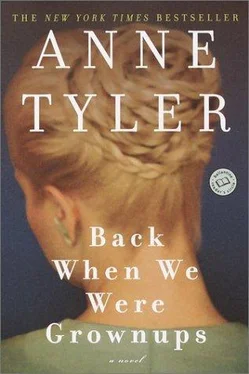“Oh, you know how these subjects come up… I really couldn’t say.”
“Well, anyhow—”
“Also liken and lichen. ”
“Excuse me?”
“ L–I-K-E-N and L–I-C-H-E-N .”
“What on earth?”
But then her mother asked when Rebecca planned to bring Will for a visit — a prospect that seemed filled with possibilities for disaster — and Rebecca shifted her focus to inventing reasons not to.
After she had hung up, though, she started picturing Will at his wedding. She saw his fine-boned, serious face surrounded by laughing young guests, and she felt such a deep sense of injury on his behalf that it was almost physical.
Yesterday afternoon, he had come over to watch a movie with her — something subtitled, black-and-white, very difficult to follow, that she had driven all the way to Video Americain to rent. And Zeb had stopped by, as often happened on Sundays, and he and Poppy got to reminiscing about old times at the Open Arms. Zeb, in particular, could pull out any number of horror tales. The wedding ceremony where Mother Davitch started sobbing and couldn’t stop, the Easter morning when Joe hid six dozen raw eggs that he thought were cooked, the after-prom breakfast they forgot to put on the calendar…
“Can you imagine where we’d be if Rebecca hadn’t shown up?” Zeb asked Will. “We all thanked our lucky stars. She turned out to be awfully good for the business.”
Will had pulled his gaze from the screen. “Rebecca, good at business?” he’d said.
“Good for business, actually. If not for her, we’d have long ago gone under.”
“Oh, for heaven’s sake,” Rebecca had said. “Why are you talking this way? The first time I helped with a party, I let fly a champagne cork straight into some woman’s bosom.”
“Right! I’d forgotten. Most comical picture,” Zeb had told Will. “Rebecca pops off the cork and crumples to the floor in mortification, so it looked as if she were the one who’d been hit. Meanwhile the woman with the bosom goes on talking, completely unaware. Falsies, was my considered opinion. I was very observant about such things in those days.”
“We never let on to my mother-in-law,” Rebecca said. “When she saw me on the floor she said, ‘Dearie? Are you all right?’ and I just said, ‘Yes, fine,’ and got up and poured the champagne.”
She and Zeb had started laughing, while Will looked from one to the other with a tentative smile that seemed prepared to broaden as soon as he got the joke. “So,” he’d said finally, “I gather you were still living at home then, Zeb.”
“Lord, yes,” Zeb had said, taking off his glasses to wipe his eyes. “Yes, I was still a kid when Joe and Rebecca married. The whole experience scarred me for life: seeing Rebecca walk out of their bedroom every morning all rosy and contented.”
Rebecca had instantly sobered. She’d said, “Stop talking rubbish, Zeb.”
It wasn’t like him to be cruel. She had glanced toward Will to see how he was taking it, but his gaze was fixed on the movie again. His head was craned forward earnestly and his long, articulated fingers were cupping his bony knees.
Stodgy, she thought now. Wasn’t that the word the wedding guest had used? Well, Rebecca knew he was stodgy! She knew his literal cast of mind, his reliance on routine, his almost laughable pompousness. (That “Dr. Allenby speaking” when he answered the phone.) The thing was, to her those traits were endearing. More than that: she felt partly responsible for them. Any time she saw him looking lost and ill at ease, she was reminded all over again that she had once abandoned him.
Which was why, yesterday afternoon, she had openly, pointedly, brazenly reached for his nearest hand and clasped it in her own.
* * *
She completely forgot about Grandparents’ Day. What was the matter with her? She made plans to go to D.C. with Will and visit a museum; Fridays he had no classes. When Peter called to remind her, she went into a secret flurry. “Oh!” she said. “Right. Tomorrow morning at… what time did you say? I’ve got it on my calendar.”
So she had to phone Will and cancel, because she couldn’t break her promise to a child — especially Peter. (Not that she wasn’t tempted.) Will was very understanding about it. Still, she felt regretful and, to be honest, more than a little put upon. When NoNo said, the next morning, “You’re awfully nice to do this,” Rebecca wanted to tell her, “You don’t know the half of it!” But she didn’t, of course. What she said was, “Oh, I’ve been looking forward to it for weeks now!”
They were standing on NoNo’s front porch, waiting for Peter to run back upstairs for his knapsack. “He’s so disorganized,” NoNo said. She was dressed in her florist’s smock, her purse already slung over her shoulder. “I tell you, mornings in this house are chaos. Find it?” she asked Peter. “All right, have a good day; I’ll pick you up this afternoon.”
She kissed the top of his head, which meant she had to rise on tiptoe because (Rebecca realized) Peter had recently undergone one of those dramatic growth spurts that seemed to strike boys overnight. His trousers were so short that they showed two inches of ankle, and his blazer sleeves exposed his wrist bones, which looked like small ivory cabinet knobs. “You’re getting to be taller than I am!” Rebecca told him as they walked toward her car.
He smiled faintly, hitching his knapsack higher on his back and sending her a sidelong glance from under his long lashes. “Next month I’m turning thirteen,” he said, and she fancied she could detect a new croakiness to his voice.
His school was on the other side of the city. No wonder NoNo complained about the drive, Rebecca thought as she maneuvered through the rush-hour traffic, the crossing guards and gaggles of children on every corner, the sullen-looking workers waiting in clumps at bus stops. This was not a time of day when Rebecca was ordinarily out in the world. “How about your car pool?” she asked Peter. “Am I supposed to pick up anybody else?”
“They’re all riding with their grandparents,” he said.
“Oh, yes.”
“This one guy? T. R. Murphy? He’s got a matched set.”
“Matched set of what?” Rebecca asked.
“Grandparents. Mother’s mother, mother’s father. Father’s mother, father’s father.”
“Lucky!” she said.
“Dick Abrams is coming with eight grandparents, but they don’t really count because a lot of them are steps.”
“I see.”
“I don’t mean stepgrandparents aren’t okay,” he said, shooting a worried look at her.
“No, I know you don’t.”
“They’re going to have to ride in three cars to get there. Really they could fit in two, but one set isn’t speaking to one of the other sets.”
“This is fascinating,” Rebecca said.
“Oh, and, um…” he said.
He drummed his fingers on his knees for a moment and stared out the side window. Rebecca waited.
“Um, would it be all right if I called you Gram?” he asked. “Just for today?”
“Why, sweetie, you can call me that every day!”
“Okay,” he said. And then, “So! Do you think that during our lifetime, people will start traveling by dematerialization and rematerialization?”
“Well, I wouldn’t mind trying it this morning,” she told him.
This was intended as a joke, but when he didn’t laugh, she said, “I suppose they might, in theory. With all that could go wrong, though, imagine the lawsuits they could end up with.”
“Lawsuits! Right!” he said. “Gosh!”
She reflected that Peter was something like a yo-yo — popping up unexpectedly in sudden bursts of enthusiasm, subsiding and then popping up again with no warning. She smiled at him, but he was watching the street and he didn’t notice.
Читать дальше












